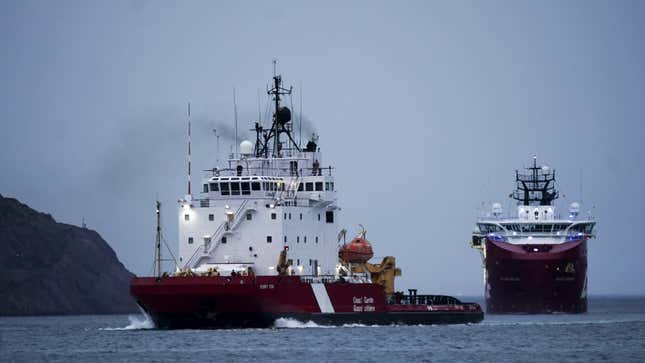The Titan Sub’s Designer Knew It Was A Deathtrap

We were all captivated by the search for a submarine full of millionaires that had gone missing while diving to the wreck of the Titanic last year. After an extensive search, the submarine’s remains were found scattered on the sea floor and now, an inquiry into just what went wrong has revealed that OceanGate’s chief engineer said they would never have ridden in the doomed sub.
An inquiry into the OceanGate disaster kicked off this week after the implosion of the Titan submarine killed all five people onboard. During questioning in the inquiry, OceanGate’s former engineering director, Tony Nissen, revealed that he told bosses at the firm that he would never ride inside the craft, reports Business Insider.
Nissen was being questioned during a hearing into the disaster by the Coast Guard Marine Board of Investigation. During the inquiry, he told the board that his relationship with OceanGate boss Stockton Rush “soured” when he revealed that he wouldn’t be comfortable piloting the sub:
“I’m not getting in it,” Nissen said he had told Rush, adding he did not trust the operations crew of the vessel.
And when he was asked whether he felt “rushed to start operations,” Nissen replied, “100%.”
Nissen testified that he was fired in June 2019 because he stopped the team from going to see the Titanic that year. He said he had told them that “it was not working like we thought it would.”
The design of the doomed sub was questioned almost as soon as it went missing on June 18 2023. The shape and construction of its hull was queried by deep-sea submarine experts, who said that their craft were almost always spherical and mostly metal to evenly distribute the force of millions of gallons of sea water. In contrast, the Titan was made of a carbon fiber tube with titanium caps at each end.
The remains of the sub were found 1,000 feet from the Titanic. Photo: U.S. Coast guard/Pelagic Research Services
OceanGate previously claimed that the design of its craft had been approved by high-profile engineering bodies such as NASA. However, in the aftermath of the craft’s disappearance it emerged that this didn’t quite happen, according to ABC:
A 2022 press release walked back the description of NASA’s involvement, saying a team of NASA engineers only consulted throughout the development and engineering of the project.
In a statement to ABC News, NASA confirmed it consulted on materials and manufacturing for the Titan submersible pursuant to an agreement with OceanGate.
“NASA did not conduct testing and manufacturing via its workforce or facilities, which was done elsewhere by OceanGate,” the statement said.
The investigation into the implosion also revealed the final transmission from the doomed sub, according to ABC News. While descending to the depth of the ocean floor, the crew of the craft reportedly radioed back “all good here” before disaster struck:
At approximately 2,274 meters, the Titan sent the message, “All good here,” according to the animation.
The last communication from the submersible was sent at approximately 3,341 meters: “Dropped two wts,” meaning drop weights, according to the Coast Guard.
All communications and tracking from the submersible to Polar Prince were lost at 3,346 meters, according to the Coast Guard.

Searching for the sub’s remains was an international effort. Photo: Jordan Pettitt/PA Images (Getty Images)
After communication was lost, the Titan sub was eventually found around 1,000 feet from the wreckage of the Titanic, which rests about 2.4 miles below the surface of the ocean. The remnants of the craft were later returned to the surface in order for investigators to figure out just what went wrong with the sub.



